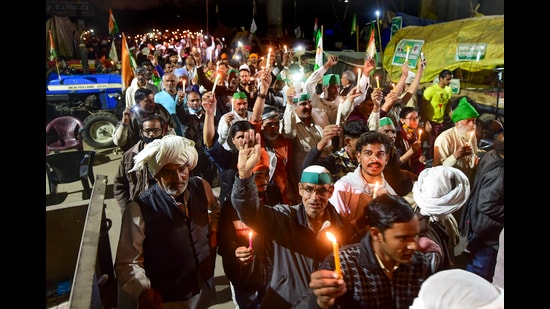How will farm protests affect electoral landscape?
Will a social movement born out of economic compulsions end up changing political equations drastically? This is now within the realm of possibility.
The farm agitation has now entered its fourth month. It’s also been a month since the dialogue between the government and farmers broke down. How long will this deadlock last?

The pressure tactics that the farmers sought to employ through the call for a Bharat bandh and rail roko andolan did not find much traction at the all-India level. Detractors could say this is because the agitation is being led by farmers from just a few northern states. If such anger against the farm laws exists in Tamil Nadu, Telangana and Maharashtra, it has not manifested itself on the streets. The agitation at the Ghazipur, Singhu and Tikri borders of Delhi is witnessing reduced numbers, though it would be premature to say that the movement is losing steam.
On the other hand, the mahapanchayats being convened in different parts of Uttar Pradesh (UP), Uttarakhand, Rajasthan and Haryana have seen progressively bigger turnouts. Political leaders are also attending these events. The agitation may not be spreading to other states, but in the states where it is present, it seems to be covering more ground.
Protest leaders say that the wedding season and the onset of the rabi crop sowing have led to a dip in numbers at the border sites. At present, the agitation is being done in relay mode, with one set of protestors taking the place of those who have to leave. Farm leaders are adamant that they are prepared for the long haul. Bharatiya Kisan Union (BKU) leader Rakesh Tikait claims that farmer discontent has spread all over the country and rallies are being held in other states too, though it may not be on the scale seen at the Delhi border areas. If his claims are true, then farmer-government tensions could worsen.
The results of the municipal elections in Punjab have added a new dimension to the whole issue and highlighted possible electoral implications of the protests. Last week, the Congress won an unprecedented victory and the Bharatiya Janata Party (BJP), which fought alone after the break in its alliance with the Shiromani Akali Dal (SAD), came in fourth. Of 2,165 wards in the municipal council and municipal corporation, the Congress got 1,484, SAD won 294, the Aam Aadmi Party (AAP) got 57 and the BJP just 47. The Congress won 68.5% of the wards, SAD 13.5%, AAP 2.6% and the BJP 2.1%. While the Congress captured the Bathinda municipal corporation after 53 years, the BJP lost even in its strongholds.
Are civic elections a harbinger for next year’s assembly elections in the state? It is perhaps too early to make definite predictions. The Congress won in 2017, but the 2015 civic elections largely went in favour of the SAD-BJP alliance. Voting preferences could be distinct for distinct polls. This was demonstrated in the December 2020 local body elections in Kerala where, contrary to all expectations, the Congress-led United Democratic Front was defeated by the ruling Left Democratic Front (LDF) — though the Congress had done well in the Lok Sabha polls just a year earlier.
Rajasthan is another state where the farm protests have had an impact. The Congress did well in the civic elections held there last month. This suggests a degree of anger against the BJP in states where the farmer agitation has been a part of the discourse.
But the real impact of the protest will have to be judged in Uttar Pradesh. In accordance with an order of the Allahabad high court, elections for panchayats in UP are to be held before April 30. The assembly elections are a year away. Western UP has become the epicentre of farm discontent, Rakesh Tikait comes from this region — and his late father Mahendra Singh Tikait led a historic farm agitation from here decades ago.
On Wednesday, when the results of the elections to the local bodies were being declared in Punjab, important BJP leaders from western UP were meeting Union minister Sanjeev Balyan in Delhi. At this meeting, it was decided that BJP leaders would talk to the farmers and other community leaders to explain the benefits of the new agricultural laws. But this is no easy task given the tensions over the past months.
Even as the meeting with Balyan was underway, a mahapanchayat was being held at Muzaffarnagar in western UP. At this forum, Naresh Tikait, president of the BKU, called for the social boycott of BJP leaders to the extent of excluding them even from weddings. Clearly, the Muzaffarnagar model, which once paved the way for the BJP’s comprehensive victory in 2014, is losing ground. Congress general secretary in charge of UP, Priyanka Gandhi, Samajwadi Party leader Akhilesh Yadav and Bahujan Samaj Party leader Mayawati are all looking at new political strategies which factor in these changes. AAP also sees growth prospects for itself in the state.
Will a social movement born out of economic compulsions end up changing political equations drastically? This is now within the realm of possibility.
Shashi Shekhar is the editor in chief of Hindustan
The views expressed are personal



